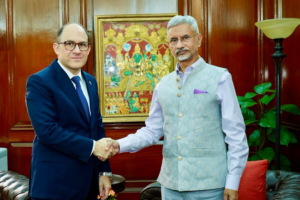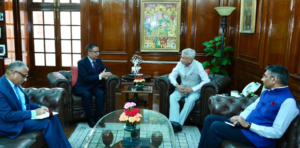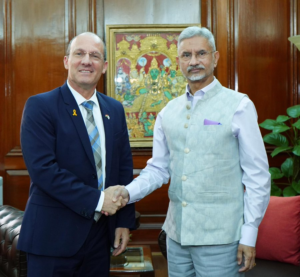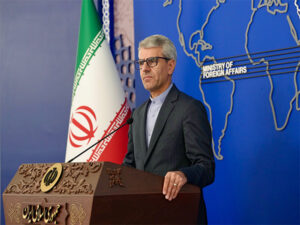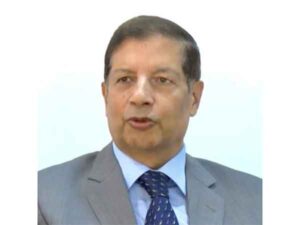US electoral financing system based on private fundraising and transparency, says top official
Washington/New York, Feb 18 (PTI) America’s electoral financing system is based on private fundraising and emphasis on transparency, with a candidate allowed to accept up to USD 3,300 from any individual while the limit for party committees is USD 41,300, according to a top US Federal Election Commission official.
Ellen L Weintraub, Vice Chair of the US’s Federal Election Commission, spoke to PTI in an interview taken following the recent landmark ruling by India’s Supreme Court to scrap the central government’s electoral bonds scheme of anonymous political funding, calling it “unconstitutional” and ordering disclosure of the bond’s donors, amount and recipients by March 13.
“We have a system that is based on private fundraising, but public transparency. Most of the money is raised privately, but it does have to be disclosed on a regular basis,” Weintraub said.
The Federal Election Commission (FEC) is the independent regulatory agency charged with administering and enforcing the federal campaign finance law.
The FEC, which is led by six Commissioners, has jurisdiction over the financing of campaigns for the US House, Senate, Presidency and Vice Presidency.
Unlike the Election Commission of India, the FEC members are political appointees. The current FEC has three members each from the Republican and Democratic parties.
Refraining from commenting on the ruling of India’s Supreme Court, Weintraub, a Democrat, said that in the US, an individual candidate is allowed to accept up to USD 3,300 from a person for any election.
But this money should not be from foreign nationals, corporations or labour unions but from individual US citizens and Green Card holders.
The money is raised in multiple ways, including online, which is quite significant. They raise money in small increments of USD 3,300.
Many times, candidates can go back to the same voters as long as they don’t get more than USD 3,300 from any one person from one election, she said.
“Then the party committees can separately raise money and their contribution limit is USD 41,300. Again, from individuals not from corporations, not organisations, and certainly not from foreign nationals. And all this money is disclosed.
“Anyone who gives more than USD 200; their name, their employer, their occupation, all of that gets disclosed to the candidates on the party committees and then the committees report that to the Federal Election Commission, and we post that information on our website,” Weintraub said.
According to the latest figures released by the FEC, so far, all the 2024 presidential candidates have in total raised USD 381 million.
President Joe Biden, a Democrat, leads the list with nearly USD 90 million, followed by his Republican predecessor Donald Trump (about USD 80 million).
Indian-American politician Nikki Haley, who is the only other candidate in the race, so far has raised USD 36 million.
“Our Supreme Court has held that this kind of transparency is important to having an informed electorate,” Weintraub told PTI in response to a question while refraining from commenting on the Indian election fundraising system.
“I don’t want to give advice to others,” she said.
“I don’t claim that our system is perfect. I think that different countries have evolved different systems. That’s fine. I do think that the transparency that we have is one of the strengths of our system. I’m proud of that aspect of it,” Weintraub said.
However, several independent think tanks and experts believe that dark money including that coming from lobbying groups and foreign companies is also playing a significant role in electoral financing in the US.
The non-partisan, independent and non-profit Open Secrets released a report on foreign-influenced corporations’ money in State elections, according to which the top 33 foreign-influenced companies gave at least USD 1 million each across six US states, collectively accounting for about USD 134 million in giving between the 2018 and 2022 election cycles.
“While America has long struggled under the weight of a deluge of spending, its once robust disclosure requirements have greatly atrophied. Today, dark money permeates the system,” Milan Vaishnav, director and senior fellow of the South Asia Programme at the prestigious Carnegie Endowment for International Peace told PTI in an interview.
Vaishnav has done important research on campaign financing.
“Today, dark money permeates the system some non-profits are allowed to spend huge sums of money on political campaigns without disclosing the identities of their donors. By some estimates, this amounted to USD 1 billion in the 2020 US election,” Vaishnav said.
Commenting on the ruling by India’s Supreme Court that came ahead of the Lok Sabha elections, Vaishnav said the Court’s unanimous decision to strike down the electoral bond scheme is welcome, if not long overdue.
“At a time when countries should be moving toward greater transparency in political funding, the opacity of electoral bonds took India in the opposite direction,” he said.
“The unfortunate reality, however, is that the pre-bond status quo is hardly ideal. The government now has an opportunity to frame a new, more transparent finance regime that could really put the opposition on its heels. (Prime Minister Narendra) Modi could spin this defeat into a victory,” Vaishnav said.
Leading Indian-American attorney Ravi Batra cited the example of Citizens United, a non-profit corporation.
In January 2010, the US Supreme Court issued a ruling in Citizens United v. Federal Election Commission, overruling an earlier decision that allowed prohibitions on independent expenditures by corporations.
“For democracy to function, we must have political parties to offer up their best candidates that can champion what their party’s platform is. Political parties to do their necessary work require money – from the rich to the poor – be it USD 5 or USD 5 billion,” Batra told PTI.
Batra added that the US Supreme Court in the “Citizens United” case ruled that “independent expenditures, including those made by corporations, do not give rise to corruption or the appearance of corruption.”
“This created soft money’, which is undisclosed to the public, as opposed to hard money’, which is disclosed, regulated and limited, but can be used by the candidate as she or he wishes,” Batra said.
India’s Supreme Court’s holding, while altruistic, stands as a weak dam to hold back the citizenry of India’s powerful desire to do what they wish to do to support those they wish to support, he added.
According to OpenSecrets, there are currently nearly 2,000 political action committees (Super PACs).
In the 2022 midterm election SuperPACs or political action committees spent more than USD 1.3 billion, while in the 2020 presidential elections, SuperPACs raised USD 3.4 billion and spent USD 2.1 billion.
So far for the 2024 election cycles, Super PACs have raised nearly USD 1 billion and spent a little over USD 210 million.

